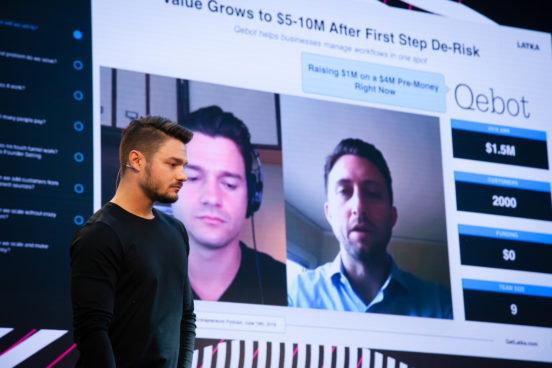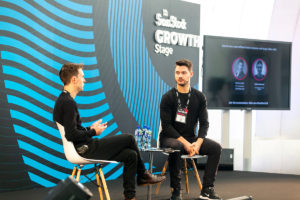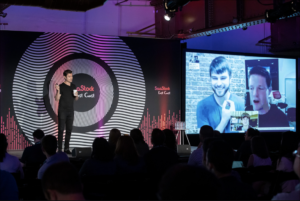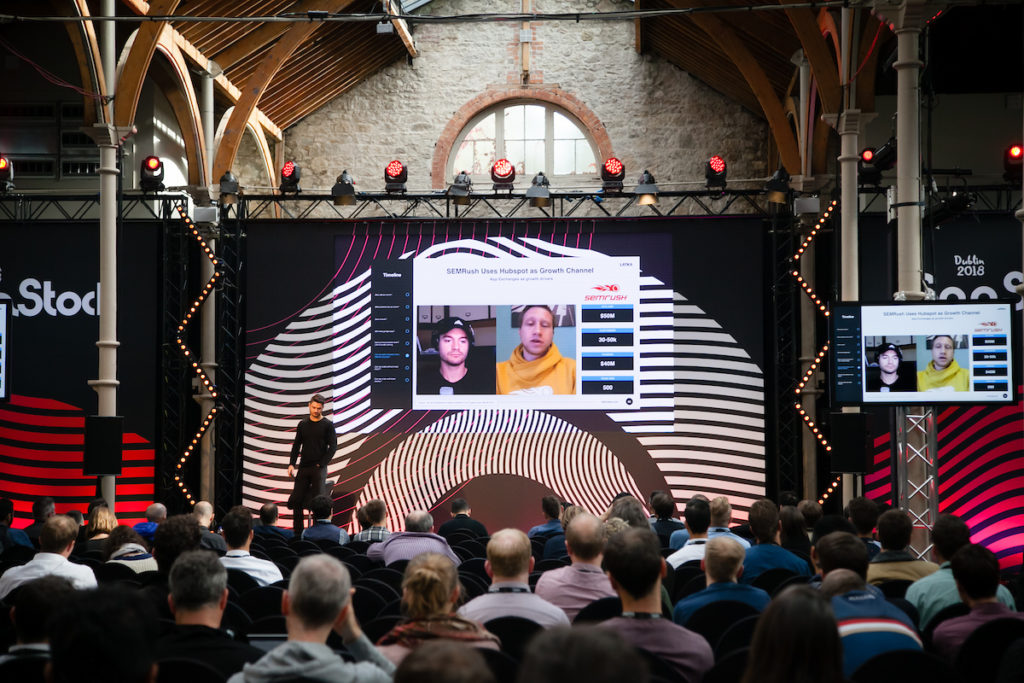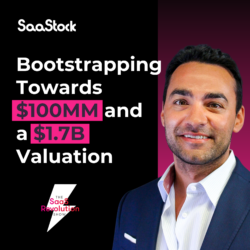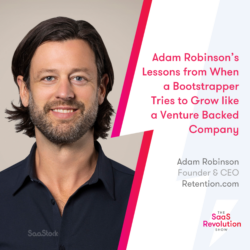The SaaS space is necessarily full of big characters. It takes a degree of personality and self-belief to survive, let alone succeed, in this fast-paced, innovative space. The ability to take educated risks means that plenty of us have excellent battle stories to tell. With this in mind, it’s always fun to sit down and chat with someone making real waves within the industry, and this was especially true in the case of Nathan Latka.
A well-known influencer in the SaaS field, Latka is comfortable on either side of the microphone, regularly interviewed across industry press in relation to his own experience as a founder and investor. However, he’s perhaps currently best known for his wildly popular podcast, The Top, which sees him conducting a daily interview with various CEOs from across the full spectrum of the SaaS space.
“The Most Sued Podcaster”
Latka’s SaaS story begins in a somewhat unlikely setting; the mountains of Southwest Virginia. Just 19 years old and with $119 in his bank account, “SaaS wasn’t even a thing” he reminisces. Nevertheless, while still a college student and with no support, he launched Heyo.com, drag and drop Facebook app that operated a SaaS model with customers paying anywhere between $30 and $300 a month. Five years later, it was valued at $10.5 million.
While this initial lack of context and mentorship hardly seemed to slow Latka down, he’s certainly making up for a lack of broader context today, with a huge repository of valuable knowledge and data gleaned from his extensive podcasting. This treasure trove of SaaS business data is shared at getlatka.com, a database ranking software companies by their growth rate. “My whole point of doing the podcast is to get hyper-connected with B2B SaaS CEOs, so I can figure out how to help them get what they want. I needed to figure out a way to build intellectual property around what it’s really like to launch a SaaS company. So that’s why I launched the show in 2015.”
Over the several years of recording that have followed, it’s fair to say Latka has cultivated something of a reputation – notoriety, even – for his interview technique. I ask him if he’s aware of his status as a man who takes no prisoners. The answer is telling. “You should title this article ‘the most sued podcaster,’” he laughs.
We dig a little deeper into this tendency to go for the jugular, needling at his guests in a way they’re doubtless unused to. “There are a lot of CEOS who just like to puff. They exaggerate. ‘We’re the biggest’, or ‘we’re the best’. Or ‘we’re the fastest-growing’. And I like to say, well, by how much? What’s your ARR? What percentage points? Fast as defined by what metric? So I will always hit people hard for data points. And sometimes if I catch a CEO kind of fibbing, or at the very least, let’s say over-exaggerating, it can turn slightly hostile.”
It’s easy to see why this approach ruffles feathers when applied to the kind of powerful founders probably more used to an attitude of praise, adulation and reverence – at risk of believing their own hype. Do they tend to recognise Latka’s persistence as a means to a necessary end? “We always end with laughs. Typically. Out of 3,000 interviews, I’ve never taken one down.”
The View From The Top
With Latka’s laudable commitment to daily episodes, The Top has earned a huge audience, chalking up tens of millions of downloads. How much of this is due to the content itself, and how much rests on Latka’s infamous interview technique? “I have to be entertaining first, and data-driven second,” explains Latka. “This also has a lot to do with podcasting generally as a medium. In order to get a really large listener base, you have to entertain first. And that then earns you the right to educate.” Given that the podcast was born out of a desire for quality data, this hefty dose of realism, in relation to what actually gets folk subscribing, is refreshing. “There’s a lot of podcasts out there that are really good but have no downloads. But no one has heard about them because they’re not entertaining.”
Latka’s approach is all about giving high-quality insights the widest exposure possible. “It’s kind of like Simon Cowell watching and giving feedback to singers, telling them they sound like a cat dying. That’s to get a reaction. It’s the same thing. It’s to get a reaction.” This starts to explain something else I’ve heard about Latka; a disconnect between his on and offline persona that catches people being introduced to him for the first time off guard, being pleasantly surprised by an easy-going attitude absent from The Top’s more confrontational presenter.
“I’d much rather people who only know me from online think that I’m really mean, and then when they meet me in person, they’re like, ‘oh my god he’s a big teddy bear!” That’s what I want people to say. Not ‘Oh, he’s so nice online – but he’s an asshole in person!”
It’s an interesting insight into someone known for playing hardball. There’s a definite respect for the expertise and experience of the CEOs he mines for data, but it’s tempered by a laser focus on clear goals: cut through the hyperbole, get to the information that really matters, deliver it in a way that ensures the widest audiences and biggest benefit to the community.
How To Read A CEO’s Mind Before You’ve Even Spoken
After so many episodes (over 3,000 at the last count) are certain patterns starting to emerge in terms of the typical character of CEOs, I wonder? According to Latka, the people he interviews neatly divide into two categories, and he knows which they’ll belong to long before the interview itself commences. “In my sign up form, I ask for a 50-word bio. There are two kinds of CEO that I interview; the ones that stick with the 50-word limit and ones who send me their whole f**king biography.”
This, combined with years of first-hand experience, tells Latka all he needs to know about the subject of his upcoming podcast. “Usually the person who sent me seven paragraphs is trying to make up for something. They feel vulnerable, so right away they want to put in every award they’ve ever won. Compare them to the most successful CEOs – they might simply say “I’m a founder.” They say virtually nothing.” I ask if this advance insight leads to an adjustment in the way he’ll conduct the interview itself.
“Yes, I absolutely use that to my advantage. In other words, if I see that my next interview coming up is with someone who’s submitted a really long bio, I know that the best way to get information from them is to make them feel slightly vulnerable. Hit them hard on something and don’t let it drop. Because they’ll want to fill that uncomfortable space with data, and try and prove themselves to me. Now, someone with a short bio, who says nothing – they’re the opposite. You basically want to be taking another approach – “Hey, I want to give credit where credit’s due. I think you built a great business. How many customers do you have today?”
The Ones To Watch
This perceptive ability to get the measure of those conforming to a type, tailoring his approach accordingly, is doubtless one of the reasons Latka wrings so much value out of the 15 minutes he spends with each interviewee. With so many episodes in the can, he must have his favourites by now?
“My favourite personality to interview is anyone who’s ex-Israeli defence. These are the most fun interviews because they’re humourous, but they’re also very strategic – like Roy Mann at Monday, for example, who I’ve had on many times. There are probably one hundred ex-Israeli founders out there, and they’re always the most fun.”
The CEOs that Latke respects the most, however, are the ones who are making themselves rich off cash flow. “They ignore the TechCrunch headlines, they ignore chasing the billion-dollar valuation,” muses Latke. “They’re just making money. And so my favourite example of that is probably someone like JD Kellog at Madwire, They’re doing 100million in ARR, bootstrapped. They just launched a big revenue sharing plan whereby their whole company shares in the profits and they’re getting rich. But you’ll never read about them in TechCrunch.”
In an industry with an undeniable fondness for the overstatement of success, it’s nice to see this tendency to buy into the culture of constant hype, press and superlatives being undercut. Praise for the startups really grafting, doing the work; quietly and well.
Bucking The Trend
Perhaps we shouldn’t be surprised to find this kind of attitude in Latka; a man with a reputation for taking an unconventional approach to business generally. His latest book, “How To Be A Capitalist With No Capital” hinges on its subtitle; “The Four Rules You Must Break To Get Rich.” I ask him why he thinks this kind of attitude is necessary to get ahead.
“The people who have wealth today are smart,” he reasons. “They would never give the keys to the castle to other people, ready to come trying to take their wealth. They climb the ladder of success and then they remove crucial rungs, to make sure that they protect their status, wealth and power by ensuring no one else can climb up that same ladder behind them.”
Latka is committed to shining a light on what he sees as tantamount to deception, reeducating those who, like the vast majority of the population, have been deliberately thrown off course by advice designed to keep them from the top. “My last ten years have been an exercise in figuring out which of these business rules are untrue,” explains Latka. “Which are the rules that wealthy people are actually using successfully themselves (even if they claim not to be) to drive real growth in their own companies.”
A prime example of this would be ‘copy your competitors.’ We’re told time and time again that we all need to be creating products that solve a new problem and come up with a unique service that everyone will flock to because it is the only one of its kind. Latka sees this as nonsense. “Actively copy your competitors,” he encourages, “and then aggressively and unapologetically out-execute them.”
Another instance of ‘established wisdom’ that Latka is looking to tear down is the myth of specialism and niche. “You hear a lot of people saying “only do one thing” which is so dumb. It’s so risky. If you lose that one thing then you’re cooked. You should always be doing like three or four things.”
Dodging Employment
To hear Latka espousing the benefits of having a number of plates spinning comes as no surprise. Start to explore the empire of SaaS influence that he’s building out, and it’s immediately apparent that he’s a pretty busy man. One reader recently described his book as containing “the cheat codes to life.” What productivity hacks does Latka personally employ?
Employment, it turns out, is the right word to have chosen here. While many in our line of work like to throw team growth stats around as a badge of honour, Latka’s committed to avoiding bringing on full-time employees. “I want to take a company public with no employees,” he smiles. His lack of full-timers is achieved by clearly defining the systems he runs his business on, each on a one-page document. He puts the document up on Fiverr Top Talent and a number or other freelancer sites, then gives the same process to five people. Paying them all, he then picks the person who does it the best.
“Then you just do it over and over again every month, and you pay them per task. For my podcast I’ve paid the same person for the past four years; $2 per podcast episode, running through the same process document. And its worked marvellously. My whole company is built around paying per system completed, per person. There are no full-time employees.”
What Goes Around, Comes Around
It’s easy to see the accomplishment and sheer output coming from Latka’s stable and assume that success came spontaneously, but it hasn’t always been smooth sailing. Most people within SaaS will admit to learning a few lessons the hard way, and he is no exception. When asked to recount a story of failure, he doesn’t miss a beat. “I raised $2.5 million for Heyo. We turned down a $6.5M acquisition offer in 2011. Four years later I sold the whole company for $300,000.” It’s gratifying to see Latka readily offer up the figures; something he’d doubtless have sought from his own podcast guests.
The sale of Heyo meant that with $1.2M in the bank at the time (and having raised that $2.5 million) they were underwater. What was Latka’s reaction? “I shut the whole company down and gave investors 70 cents on the dollar. I could have stayed in that company and made a cushy salary for many years, but I was young and single with no responsibilities.” His priority was to free up his time to go and launch something new, which fortunately for our community, was The Top podcast. While many people would look at the way things played out with Heyo and see a failure (and let’s be real, Latka did lose investors money) he can see the silver lining. “Now I’m in a bunch of those investors’ funds,” he reflects. “You know, I appreciate that many other people would see that as a failure. But it all comes around.”
The Future Of SaaS
You may have guessed, we are fans of Nathan and his approach to life, podcasting and SaaS. There is a reason he and his State of SaaS presentation have been a permanent fixture at every SaaStock conference this year. Our flagship conference in Dublin will be no exception. On Tuesday, October 15th, he’ll take to the stage to give us a 30-minute glimpse into his crystal ball of data with “The State of SaaS in 2019”, helping the rest of us to benchmark and predict who may get acquired, raise, or IPO next. He will also record a few podcast episodes on the Podcast stage with those who can take the heat of live recording with Nathan. In case you can’t wait until October, you can catch Nathan at SaaStock West Coast on September 11th.
For a man with access to so much valuable insight, he’s certainly altruistic about sharing the value widely amongst the SaaS community. “I think it’s generally an open and sharing community” Latke muses, “because founders realise that ultimately whoever wins, it’s going to come out in the execution – it’s not some secret thing that you chose not to share.” Are there tangible, personal benefits to being more open? He thinks so – “The people who don’t share the most tend to be the ones that are really struggling. Really, they’re the ones who should be sharing the most because that’s how they’re going to get the help they need. By sharing their struggles.”
With so many data points at his fingertips, and a crack team of freelancers supercharging his continued exploration of the SaaS universe, what does Latka see in the near future of our industry headed? “Well, I think that software will continue eating the world,” he reflects. “I think venture capital is going to go out of favour. I think a lot of SaaS CEOs are going to realise that they don’t need VCs, and will start using venture debt or things of that nature to grow their companies.”
Does he think that some of the metrics we rightly or wrongly seem to put on a pedestal will start to be reevaluated, in line with the candor that he favours on his podcast? “Yes, profitability will be celebrated again. You’re going to see a lot of wealth created and I’m excited to be right in the middle of it with SaaStock.” Nathan Latka – firebrand interviewer, founder, author, teddy bear – the feeling is entirely mutual.

